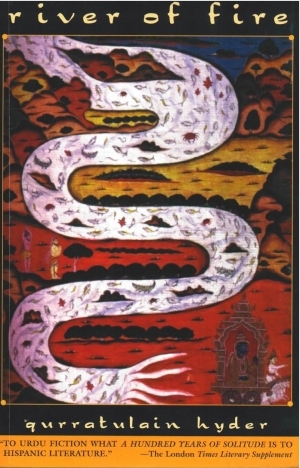
Recommended by Aparajita Dutta:
Aparajita is very passionate about this book. When I told her that I am going to feature this book today, her excitement drew me to this book. This is what a writer's book should do to a reader. I almost envy Ms. Hyder for this love that she has invoked in a reader. Here is what Aparajita has to say about this book.
"It's because it starts from the time of Buddha and ends after the independence of India and the most captivating part is how the characters come back again and again...and how they are so connected.. It will make you feel like even if you are living in the 21st century, you are some sculptor or a seer of the post-Vedic era.. it talks about the survival of humanity.. It's not just a novel .. It's life.. it has so many letters...journals... poems.. It made me cry.. it made me shriek with fear. It's a mystery... It's adventurous.It writes history in the way no other book does."
Book Spotlight: River of Fire: Aag Ka Darya
Author: by Qurratulain Hyder
Print Length: 428 pages
Publication Date: January 29th 2000
Blurb:
Never before available in English, River of Fire, originally published as Aag ka Darya in 1959, is without question the most important novel of 20th-century Urdu literature. An amazing, sui generis book, River of Fire spans two and a half millennia. Set during four Indian epochs (the classical, the medieval, the colonial, and the modern post-national), the novel is a meditation on history and human nature, tracing four souls through time. Each section is linked by characters who bear, in every period, the same names: Gautam, Champa, Kamal, and Cyril. Gautam (appearing first as a student of mysticism at the Forest University of Shravasti in the 4th century B.C.E.) and Champa (throughout embodying the enigmatic experience of Indian women) begin and end the novel; Muslim Kamal appears mid-way through, as the Muslims did, and loses himself in the Indian landscape; and Cyril, the Englishman, appears later still. In different eras, different relations from among the four -- romance and war, possession and dispossession. Yet together the characters reflect the oneness of human nature: amidst the nationalist and religious upheavals of Indian history, Hyder argues for a culture that is inclusive.
Interweaving parables, legends, dreams, diaries, and letters, Hyder's prose is lyrical and witty. There is really no book like River of Fire. Qurratulain Hyder was awarded the Bharatiya Gnanpith, India's highest literary award, in 1989, and here is her masterpiece, her broadest canvas and her finest art
Interweaving parables, legends, dreams, diaries, and letters, Hyder's prose is lyrical and witty. There is really no book like River of Fire. Qurratulain Hyder was awarded the Bharatiya Gnanpith, India's highest literary award, in 1989, and here is her masterpiece, her broadest canvas and her finest art
Grab River of Fire and the author would appreciate a
Review on Amazon or a rating in Goodreads








.jpg)




0 Comments